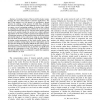Free Online Productivity Tools
i2Speak
i2Symbol
i2OCR
iTex2Img
iWeb2Print
iWeb2Shot
i2Type
iPdf2Split
iPdf2Merge
i2Bopomofo
i2Arabic
i2Style
i2Image
i2PDF
iLatex2Rtf
Sci2ools
LCN
2005
IEEE
2005
IEEE
A Novel Tuneable Low-Intensity Adversarial Attack
— Currently, Denial of Service (DoS) attacks remain amongst the most critical threats to Internet applications. The goal of the attacker in a DoS attack is to overwhelm a shared resource by sending a large amount of traffic thus, rendering the resource unavailable to other legitimate users. In this paper, we expose a novel contrasting category of attacks that is aimed at exploiting the adaptive behavior exhibited by several network and system protocols such as TCP. The goal of the attacker in this case is not to entirely disable the service but to inflict sufficient degradation to the service quality experienced by legitimate users. An important property of these attacks is the fact that the desired adversarial impact can be achieved by using an non-suspicious low-rate attack stream, which can easily evade detection. Further by tuning various parameters of the attack traffic stream, the attacker can inflict varying degrees of service degradation and at the same time making it ex...
| Added | 25 Jun 2010 |
| Updated | 25 Jun 2010 |
| Type | Conference |
| Year | 2005 |
| Where | LCN |
| Authors | Salil S. Kanhere, Anjum Naveed |
Comments (0)

